[GSE2023]The Successful Accomplishment of the GSE 2023 “Student Forum on Innovative Design for Future Education”
date:2023-09-01 17:28author:adminsource:Smart Learning Instituteviews:
“Student Forum on Innovative Design for Future Education” was held in Changping Campus of Beijing Normal university on the afternoon of August 20th (GMT+8). Based on the actual situation of their countries and regions and combined with their own experiences, 13 outstanding college student representatives from China, Indonesia, Bangladesh, Myanmar, Vietnam, Rwanda, Sierra Leone, Eritrea, Tanzania and Italy, as well as experts, scholars and elites from education, design and other related fields, shared their opinions and innovative solutions of the future education from four dimensions: “Promoting Inclusive Education”, “Developing Digital Competence of Teachers”, “Designing Equitable Learning Environments” and “Fostering Digital Transformation of Learning”. Several guests of honor attended the forum, including Mr. SONG Weizu, Founder of Beijing Design Society and Deputy Director of the Central Cultural Committee of the China Democratic League; Ms. Natalia Amelina, Senior National Project Officer in Education at UNESCO Institute for Information Technologies in Education (UNESCO IITE); Ms. Galina Udayadas, Programme Assistant at Unit of Teacher Professional Development and Networking, UNESCO IITE; Mr. HAO Qingjie, Deputy Secretary-General of China Association of Higher Education; Prof. CHEN Guangju, Vice Director of the School Affairs Committee at Beijing Normal University; Ms. NI Jiaqi, Deputy Secretary of the Youth League Branch Committee at Beijing Normal University. The forum was held online and onsite, and was co-moderated by Ms. WANG Huanhuan, Dr. Mohamed Oubibi, Dr. Michael Agyemang Adarkwah from Beijing Normal University and Mr. BAO Haogang from The China National Academy of Educational Sciences (CNAES).
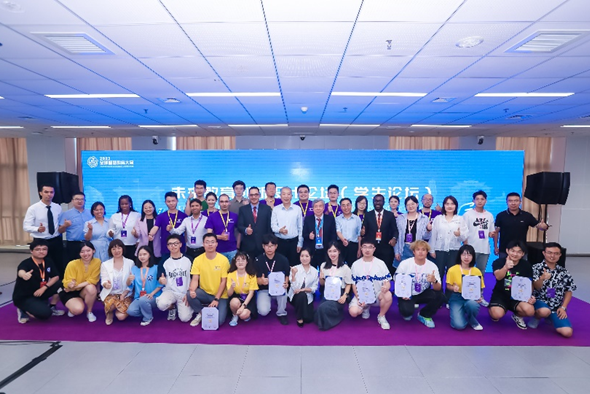
A group photo of some of guests, speakers, students and staffs
Guests’ Views
Mr. SONG Weizu, Founder of Beijing Design Society and Deputy Director of the Central Cultural Committee of the China Democratic League, pointed out that as the new wave of technological revolution and industrial transformation deepens, human society will usher in an era of human-computer collaboration, cross-border integration and co-creation and sharing. Design is the core element of human innovation and development, and the core that really plays a role in design is humanity. Therefore, the issue of human education has naturally become a key issue in the era of technological revolution and innovative development. Mr. SONG hopes contemporary college students to explore the formations, paths and needs of future education from the perspective of Mr. SONG Weizu delivered an opening remark design thinking, and provide innovative solutions.
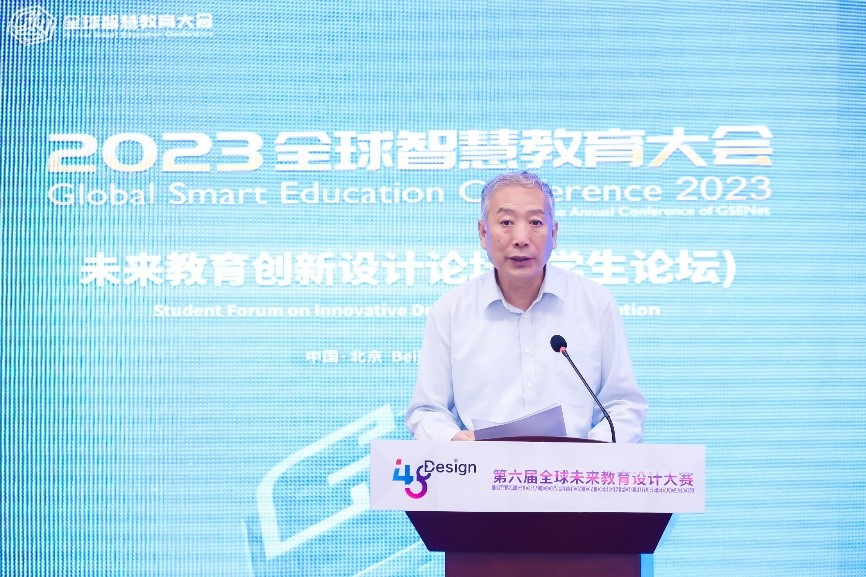
Mr. SONG Weizu delivered an opening remark
Ms. Natalia Amelina, Senior National Project Officer in Education at UNESCO IITE pointed out that how to provide quality education for learners is a new challenge for teachers in the era of artificial intelligence. In 2015, the United Nations General Assembly adopted the “2030 Agenda for Sustainable Development”, calling on all countries to take action to address the economic, social and environmental sustainability issues facing the world today. One of 17 Sustainable Development Goals (SDGs) emphasizes ensuring inclusive and equitable quality education and lifelong learning opportunities for all. In the practice of rural education, UNESCO recognizes the urgency of promoting educational transformation. It aims to promote the sustainable development of education, unleash the potential of education to cultivate innovate talents, reshape a learner-centered global learning community, and establish a smart education ecosystem.
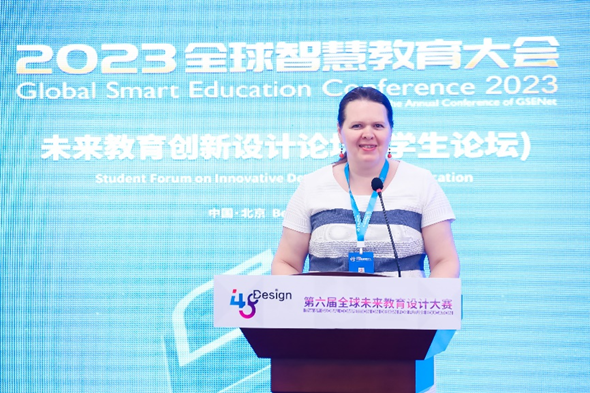
Ms. Natalia Amelina delivered an opening remark
On behalf of Beijing Normal University, Ms. NI Jiaqi, a Deputy Secretary of the Youth League Branch Committee, pointed out that Report to the 20th National Congress of the Communist Party of China stressed that the central task of the Communist Party of China will be to lead the Chinese people of all ethnic groups in a concerted effort to realize the Second Centenary Goal of building China into a great modern socialist country in all respects and to advance the rejuvenation of the Chinese nation on all fronts through a Chinese path to modernization. Education, science and technology, and human resources are the foundational and strategic pillars for building a modern socialist country in all respects. In 2022, the United Nations Transforming Education Summit (TES) called on countries to actively promote education transformation by focusing on the five Thematic Action Tracks: inclusive, equitable, safe and healthy schools; learning and skills for life, work and sustainable development; teachers, teaching and the teaching profession; digital learning and transformation; financing of education. As the benchmark of normal universities, Beijing Normal University shoulders the mission of bridging the basis of basic education and the leader of higher education. She hopes that by continuing the student forum, college students around the world will share their opinions on “Innovative Design for Future Education”, so that all sectors of society will pay attention to the aspirations of college students.
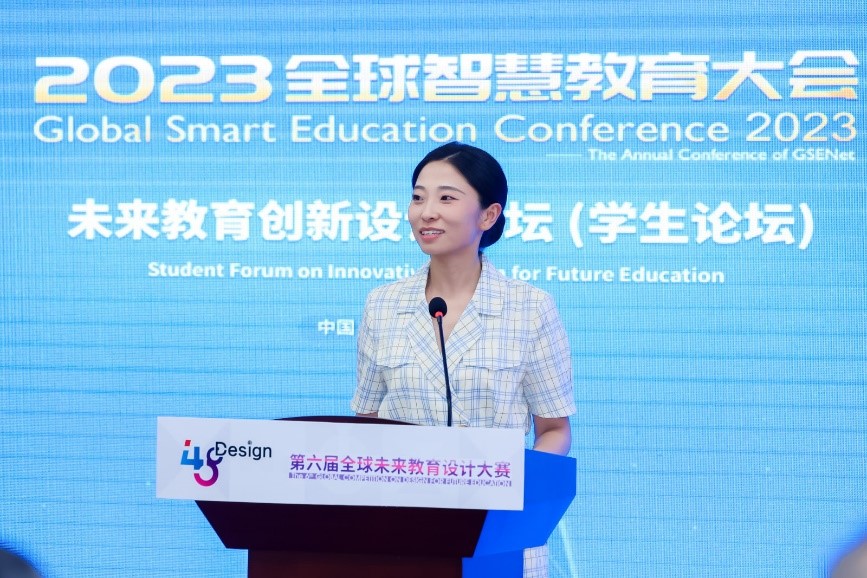
Ms. NI Jiaqi delivered an opening remark
How to Promote Inclusive Education
According to UNESCO, Inclusive education refers to “a process of addressing and responding to the diversity of needs of all learners through increasing participation in learning, cultures and communities, and reducing exclusion from education and from within education”. Inclusive Education is a crucial component of the SDGs for education, and the TES identified quality education for all as one of the five priority areas for action.
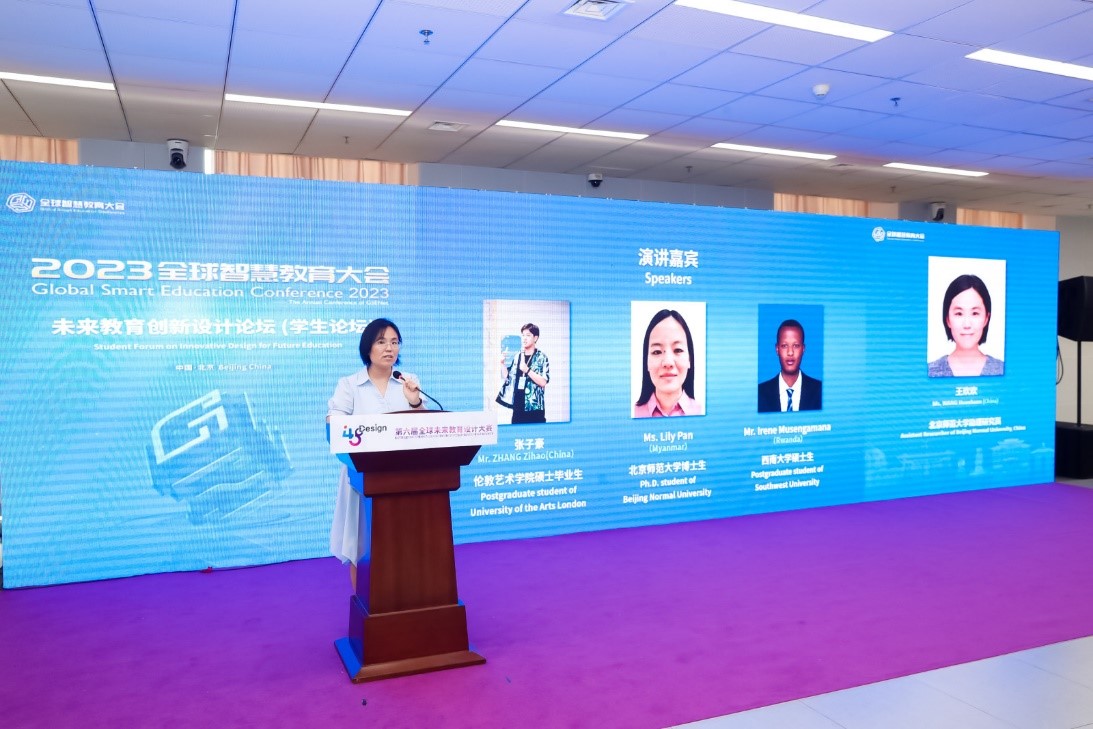
Moderator: Ms. WANG Huanhuan
Mr. ZHANG Zihao, a postgraduate from University of the Arts London, pointed out that there are very few inclusive education schools in China, mainly concentrated in first-tier cities like Beijing, Shanghai, Guangzhou, and Shenzhen. He suggests the design of an online and offline hybrid learning community for children with special needs, where community empowerment can promote the transformation from special education to inclusive education. Community staffs and volunteers can organize offline workshops based on a guiding manual, enabling children with special needs to engage in real-world tasks alongside their peers, thus granting them opportunities to interact with ordinary children and broader society. Children and parents can also utilize the online community to access learning resources and community events, and engage in discussions.
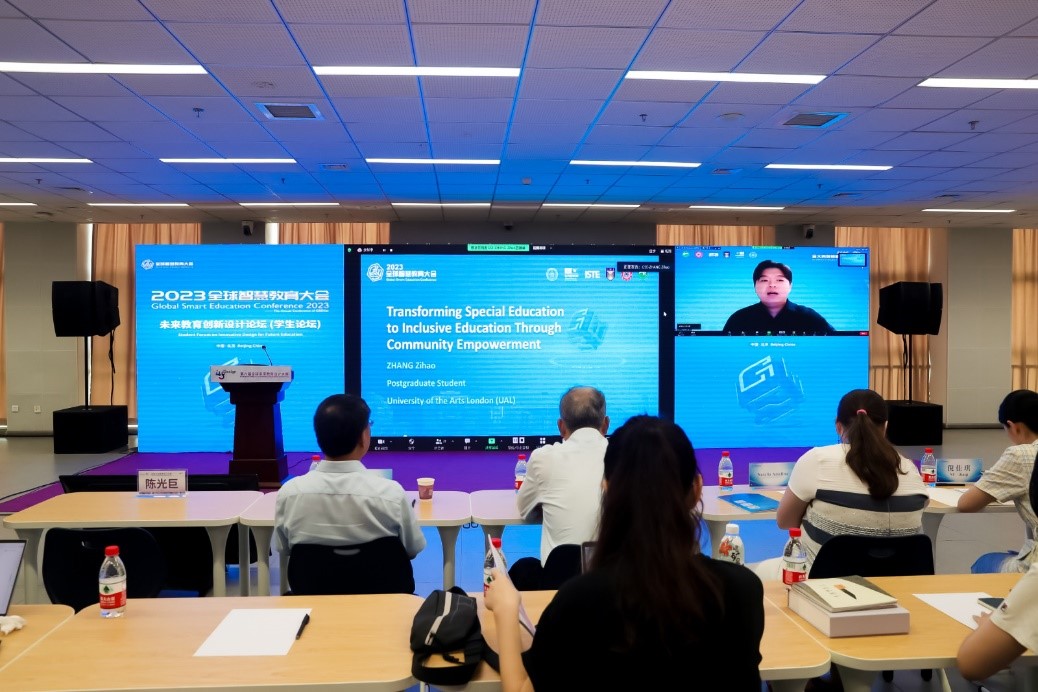
Speaker: Mr. ZHANG Zihao
Ms. Lily Pan, a Ph.D. from Beijing Normal University, held that Myanmar’s education system continues to be influenced by substantial disparities in housing and living conditions between rural and urban areas, the socio-political environment and other complex factors. Peace matters for inclusive education in all countries. Due to the lack of communication and harmony between the current government and armed forces, In certain areas under armed control, the government and military struggle to provide basic education facilities and learning resources for national children, and even the safety of children cannot be ensured. Despite the efforts of the United Nations Children's Fund (UNICEF) to offer educational support nationwide to assist children’s learning and to facilitate language development, further actions are needed for making education reachable for the marginalized and vulnerable groups. This expansion aims to maximize the physical and mental well-being of every child and uphold their right to education.
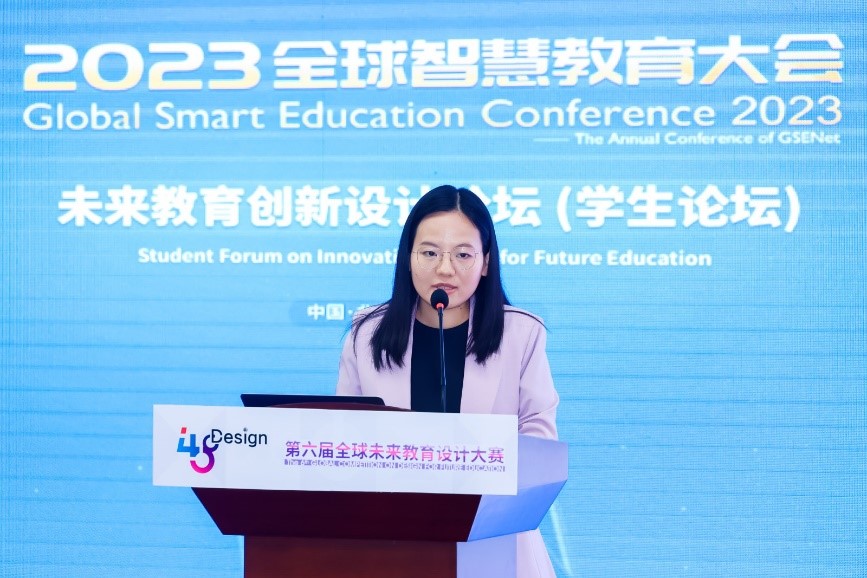
Speaker: Ms. Lily Pan
Mr. Irene Musengamana, a postgraduate from Southwest University, mentioned that In Rwanda’s context “inclusive education” is often interpreted as “non-exclusionary education”. Rwanda has introduced a series of national policies and practices to promote inclusive education since 2017, giving priority to offering equitable access to education for students with special needs. He pointed out that the education in Rwanda suffers from poor teaching quality, rigid method and curriculum, inaccessible environment and other problems. The students with special needs are integrated in mainstream schools but not really included both academically and socially. It is important to combine the power of policymakers, school administrators, teachers, parents and curriculum designers for fostering the attainment of inclusive education.
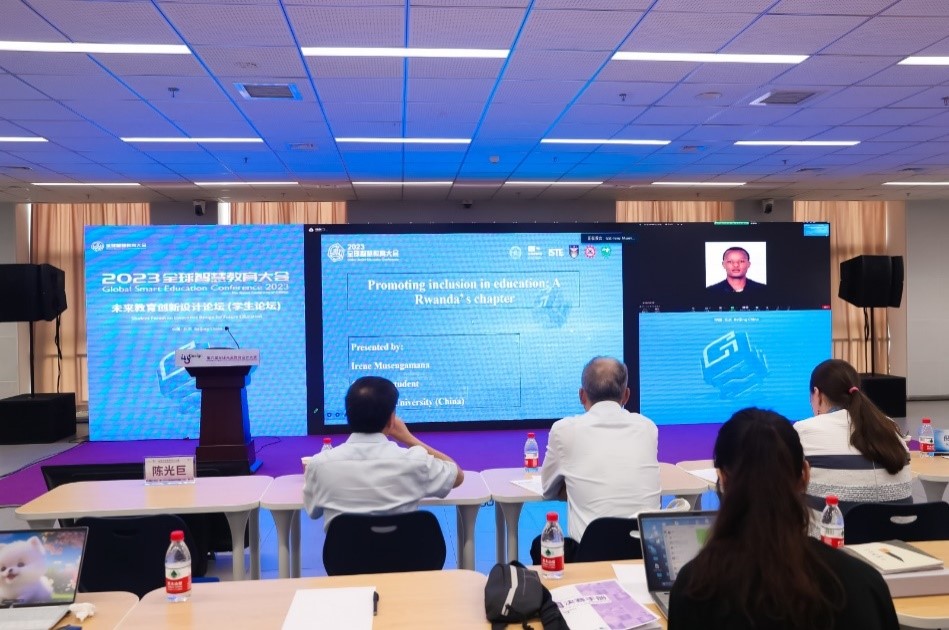
Speaker: Mr. Irene Musengamana
How to Develop Digital Competence of Teachers
Digital literacy of teachers refers to the awareness, ability and responsibility of using digital technology to acquire, process, use, manage and evaluate digital information and resources, discover, analyze and solve educational and teaching problems, optimize, innovate and transform educational and teaching activities. It has gradually become an important factor influencing the high-quality development of education. The TES emphasized the cultivation of digital competence of teachers.
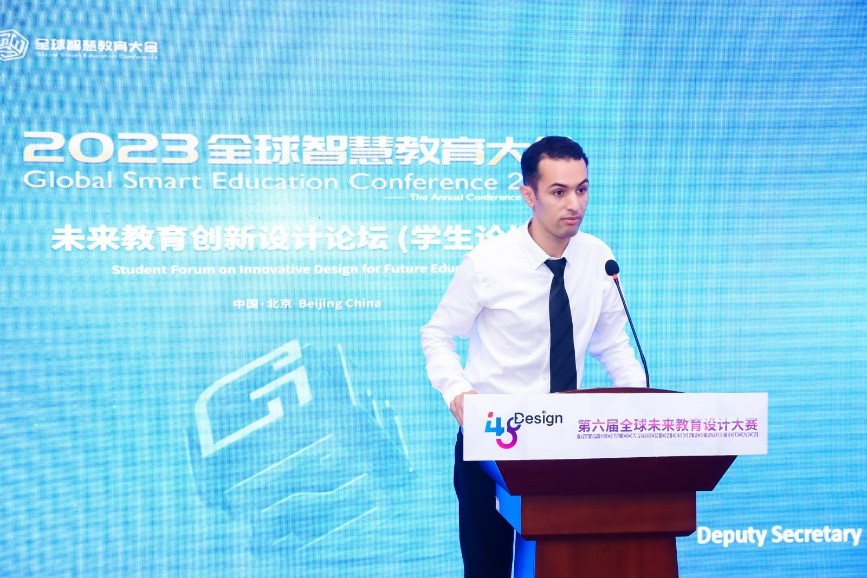
Moderator: Dr. Mohamed Oubibi
Mr. David Bull, a Ph.D. from Beijing Normal University, shared with us the situation of teacher education in Sierra Leone, in where significant number of unqualified and new teachers accounts for the increasing teacher work force. The existence of digital divide severely hampers the development of teachers’ professional competence. He proposed to design a smart learning environment for teacher professional development (SLETProD) to provide a cloud-based platform for seamless access to digital technology resources, such as UNESCO E-library and so on. Through promoting co-construction and sharing of digital resources, we can foster subject knowledge upgrade, meet the needs of personalized and collaborative learning and promote the construction of digital learning community.
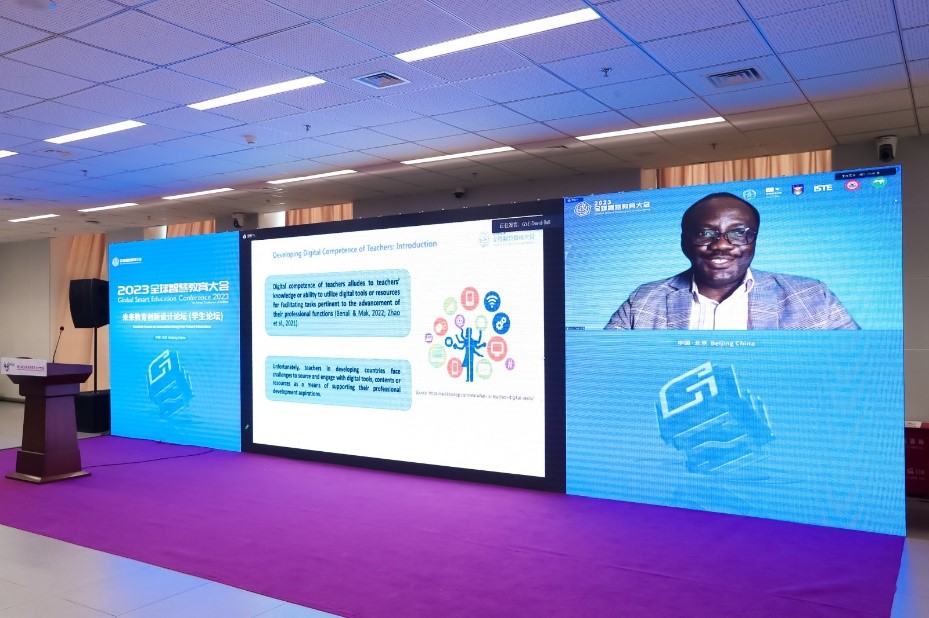
Speaker: Mr. David Bull
Mr. GONG Hongjie, a prospective postgraduate from South China Normal University, held that there is a gap in digital competence between rural teachers and urban teachers in the era of Education 4.0. Due to obsolete teaching equipment, inadequate teacher training system and other factors, the digital literacy of rural teachers needs to be improved to meet the industry standards outlined in the “Digital literacy of teachers” issued by Ministry of Education of P.R.C. He proposed the application of “U-G-S” innovation model, in which universities, governments, urban schools, suburban schools and rural schools to jointly build urban-rural teaching and research community. Through system construction, resource sharing and technology expansion, the digital literacy of rural teachers can be improved to promote the sustainable development of rural education.
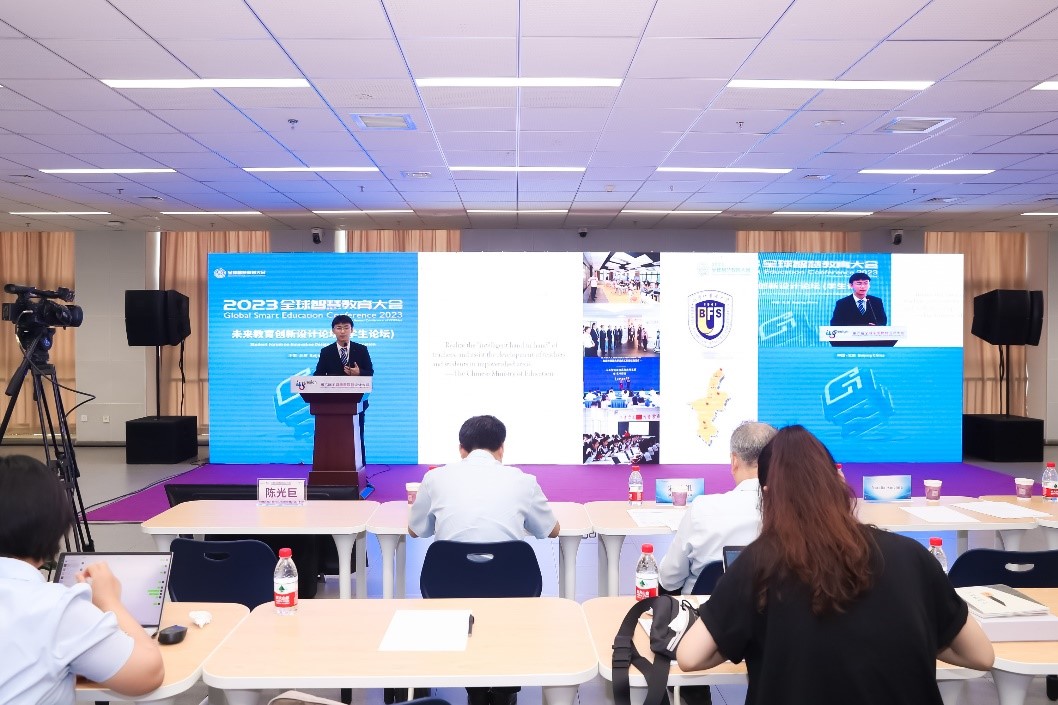
Speaker: Mr. GONG Hongjie
Dr. Samson Kifletsion Elias, a post-doctor fellow at Southwest University, pointed that the government of Eritrea has introduced some national policies to explain and promote Information and Communications Technology (ICT) integrated teaching. However, the research indicates that Eritrean teachers hold a narrow and simplistic perception regarding ICT usage and inadequate readiness on ICT practices. Local teachers are not good at using computers to make and share digital learning resources. Meanwhile, senior teachers use computers less frequently than their younger counterparts, which leads to unsatisfactory teaching performance. To improve the digital competence of teachers, he believes we should strengthen teacher vocational training, with infrastructure development and support from governments and other institutions.
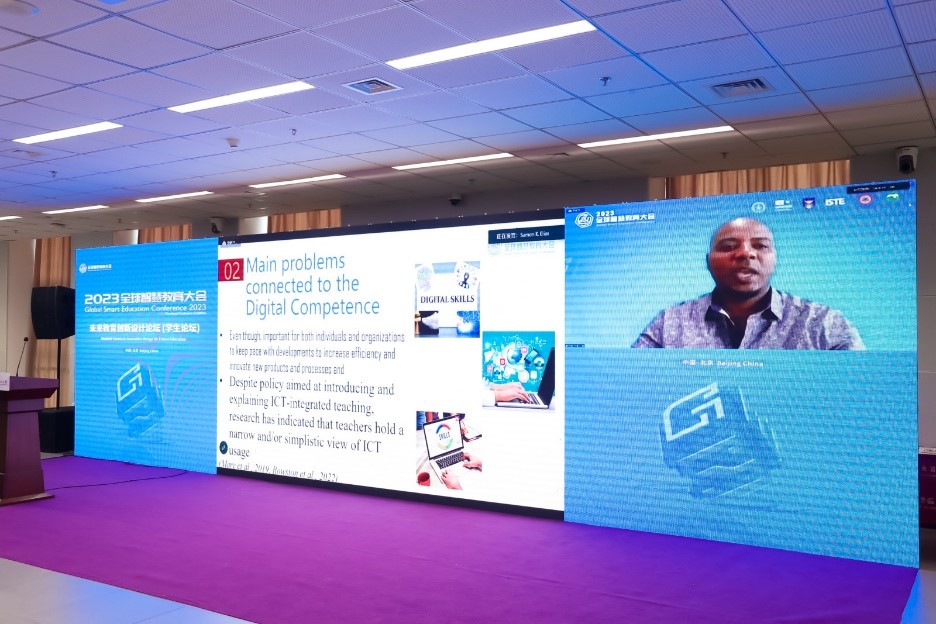
Speaker: Dr. Samson Kifletsion Elias
Ms. Fortunatha Lawrence Mtesigwa, a Ph.D. from Beijing Normal University, emphasized that for any country to thrive and attain digitally literate people, the digital education of teachers is inevitable in both Initial Teacher Education (ITE) and continuous Teacher Professional Development (TPD). Tanzania has improved national formal and informal education through digital technologies, while it still lacks of supportive infrastructure (such as electricity connection, internet), ICT equipment and personnel to utilize ICT. To integrate digital technologies into teaching and learning, she designed a curriculum model of digital competence transformation for pre-service teacher training in Tanzania, which consists of seven stages: substitution, augmentation, modification, redefinition, innovation, final projects, assessment and evaluation.
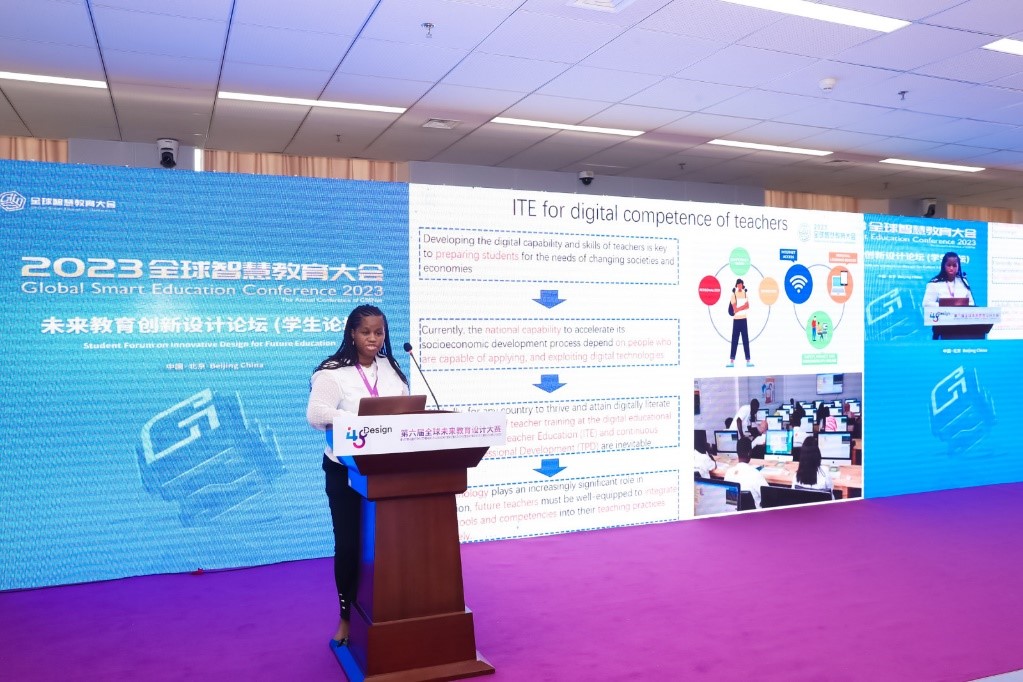
Speaker: Ms. Fortunatha Lawrence Mtesigwa
How to Design Equitable Learning Environments
The design of learning space can create a personalized and inclusive environment for learners and better support the development of various learning activities. In the era of artificial intelligence, learning space are evolving into multiple learning spaces integrating physical and virtual space. The TES emphasized creating safe and inclusive learning spaces to ensure all children have access to education, including marginalized children.
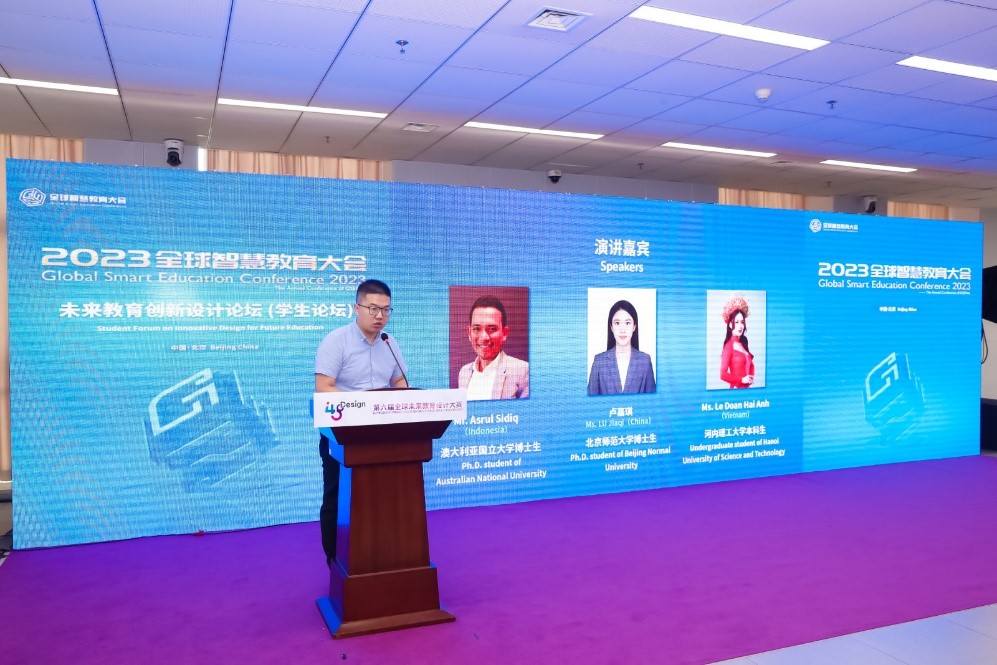
Moderator: Mr. BAO Haogang
Mr. Asrul Sidiq, a Ph.D. from The Australian Nation University, pointed out that Indonesian education system faces significant socio-cultural, economic, and geographical challenges. It is difficult to meet the goals for providing quality education in all regions, particularly in the frontier, outermost and least developed region. National Government conducts periodic and comprehensive evaluations of the education system’s performance, which prioritizes fundamental competencies such as literacy, numeracy, and character rather than specific subjects. He proposed fostering digital transformation of school and other education institutions to promote the co-construction and sharing of resources, allocating budgets to meet the needs of internet access and media of schools, and constructing the public digital resources platform for teachers.
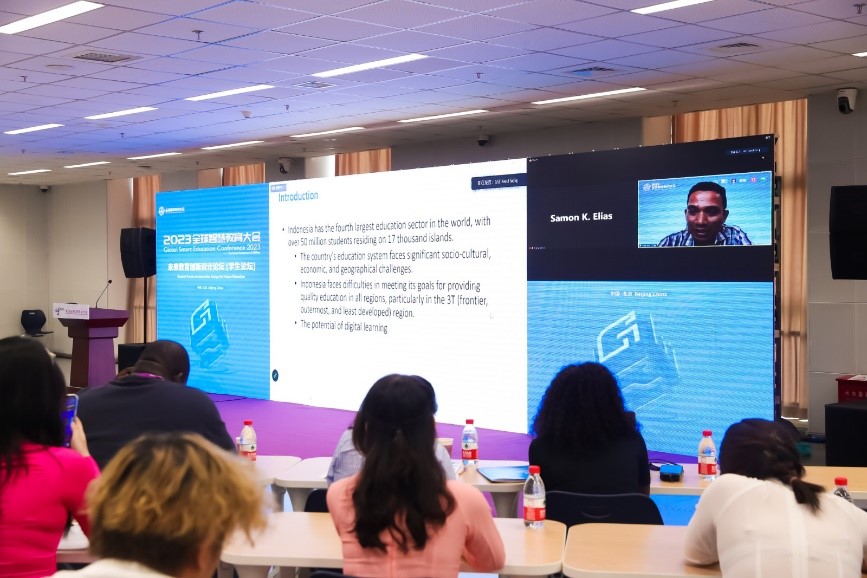
Speaker: Mr. Asrul Sidiq
Ms. LU Jiaqi, a Ph.D. from Beijing Normal University, highlighted that educational research plays a rational guiding role in promoting school reform and development, an innovative driving force to improve school-running benefit and quality and promote the sustainable development of schools. The development of educational research in China is restricted by difference of teachers’ cognition and attitude, absence of digital consciousness, unnecessary research resources waste and inadequate process management and so on. She believed that building a resource sharing platform specially for educational research, like European Open Science Cloud (EOSC), with data legislative, regulatory framework and copyright. She also proposed reducing the space-time and security experimental restrictions through digital technology and strengthening the standardization of education research to ensure the fairness and transparency of relevant projects.
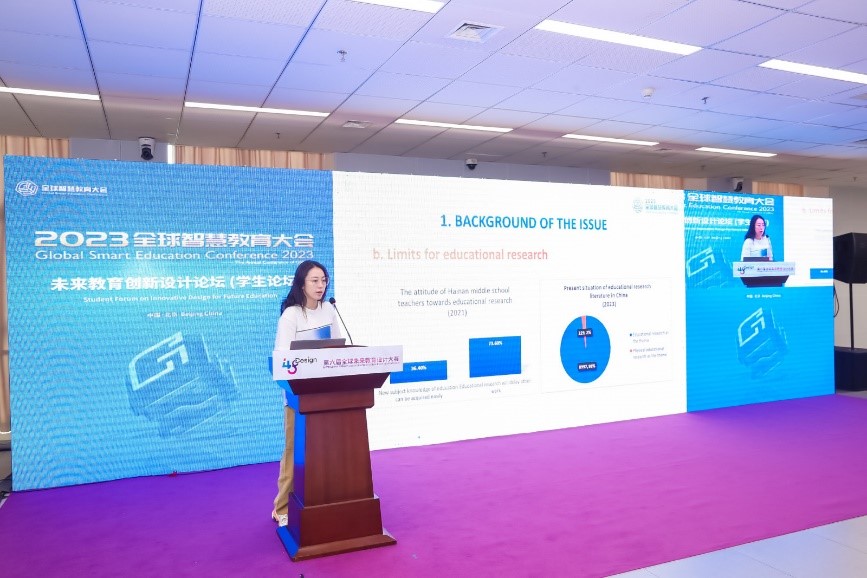
Speaker: Ms. LU Jiaqi
Ms. Le Doan Hai Anh, an undergraduate from Hanoi University of Science and Technology, emphasized that from the perspective of liberatory thinking, designing equitable environment beyond only working to stop the negative consequences of inequity, but also means promoting the equality of educational values. In Vietnam, the proportion of children who drop out of school in the poor group is significantly higher than in the rich group, and only 46.3% of young people are enrolled in higher education. She proposed to provide personalized learning and training for students in marginalized areas and under-represented groups, and school counseling to dismantle stereotypes and tackle social norms.
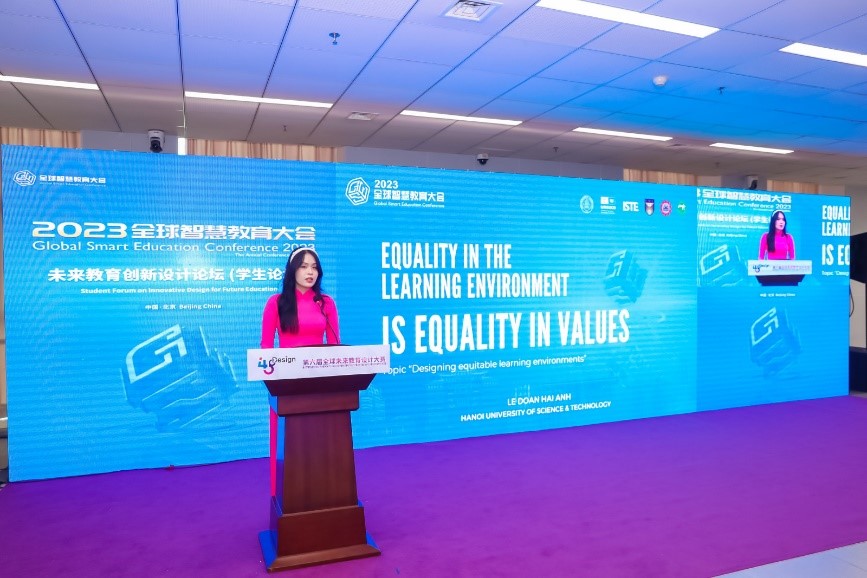
Speaker: Ms. Le Doan Hai Anh
How to Foster Digital Transformation of Learning from Students’ Perspective
Based on digital transformation, the future education will achieve the digitalization of teaching content and learning methods with the help of information technology and the Internet, and actively explore innovative learning models and promote global learning and cooperation. The TES stressed that the digital revolution must benefit all learners, ensure connectivity and digital learning opportunities for all, build and maintain robust, free and public digital learning contents and platforms.
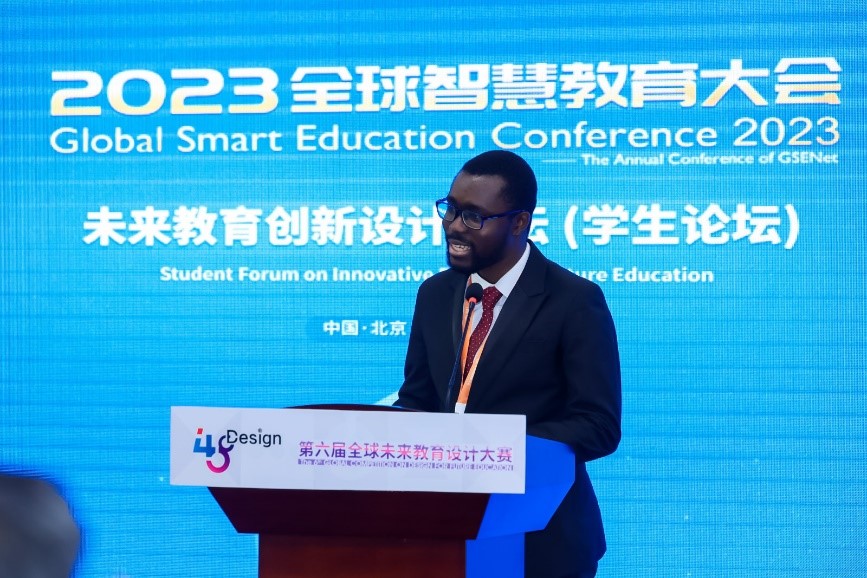
Moderator: Dr. Michael Agyemang Adarkwah
Mr. Zhang Zishuo, a graduate from Beijing Normal University, held that text, pictures, audio and video, as four common educational media formats, have limitations in representing the models of complex three-dimensional objects. Although 3D models can realistically present the structure and features of objects, it is difficult to be widely used in learning process due to the limitation of extend and intricate production cycles, expensive virtual reality equipment, and inconvenient sharing procedures. He and his team members are committed to designing and developing 3D teaching and learning products that facilitate rapid creation, sharing, real-time interaction, and compatibility across multiple devices. They have achieved some commercial landing results, providing a novel medium of knowledge dissemination.
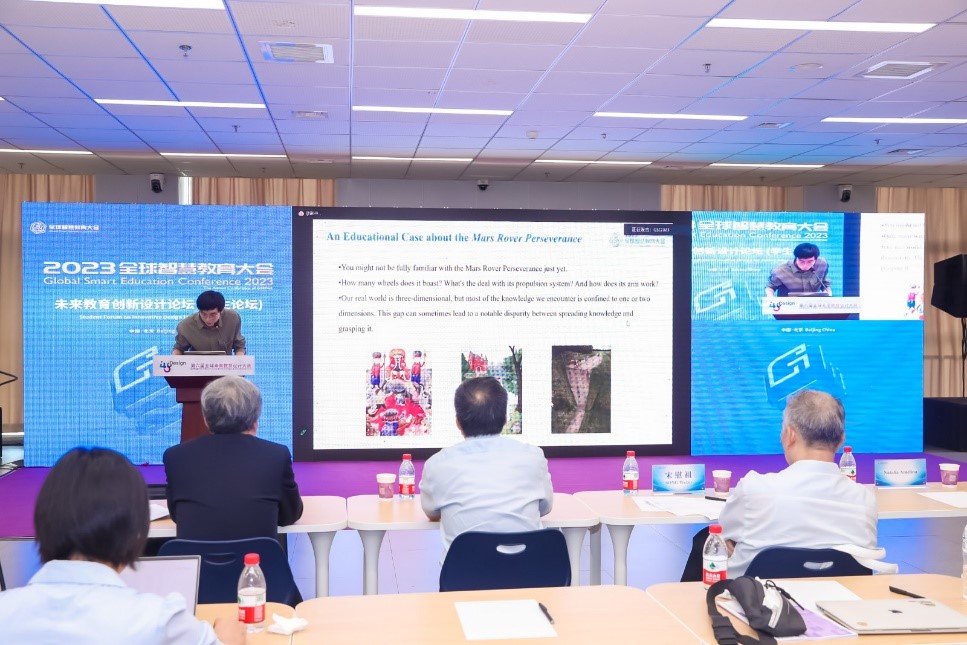
Speaker: Mr. ZHANG Zishuo
Mr. Zia Islam, a Ph.D. from Asian Institute of Technology, emphasized that the generation of “Born Digital” are generally tech-savvy, prefer visual interactive learning experiences supported by virtual reality or augmented reality (AR or VR) technology, are comfortable with processing intricate information, and tend to be multitaskers. Understanding the unique characteristics of “Born Digital” students is essential for educators to adjust teaching strategies and use appropriate educational tools to provide students with better learning experience. He believes that the application of generative AI technology in education can automatically generate learning resources or quizzes tailored to the needs of individual students, thereby creating personalized learning pathways for students. It can also act as a virtual teaching assistant or a research tool, providing immediate, on-demand support to students.
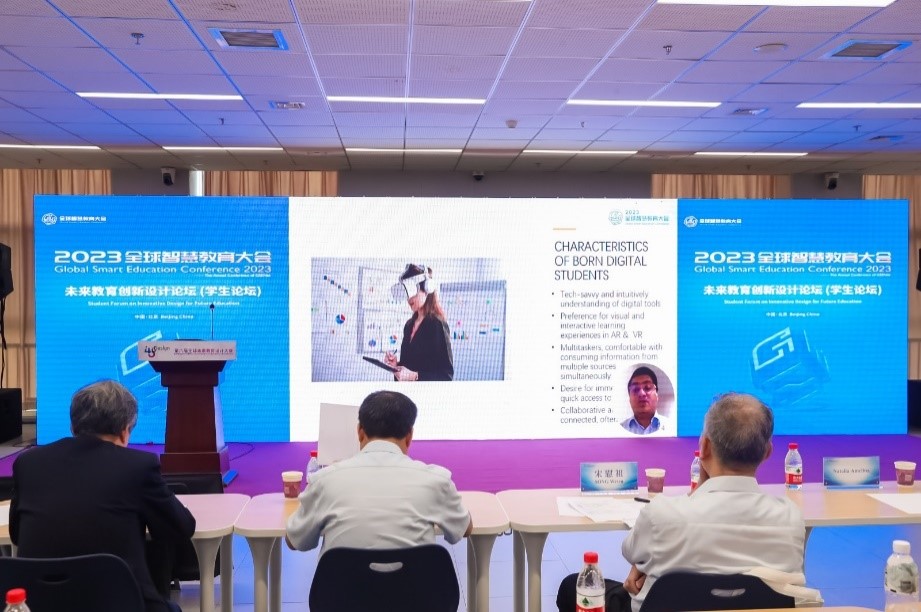
Speaker: Mr. Zia Islam
Ms. Camila Cimadamore-Werthein, a Ph.D. from University of Cambridge, mentioned that mental health and well-being is an integral part of UNESCO's promotion of safe and inclusive learning environments. Monitoring and tracking the mental health status of students is a key step towards addressing mental health issues. Based on natural language processing (NLP) technology, she and her team members have built a Computerized Adaptive Test for anxiety assessment model, which can be a useful tool to assist teachers intelligently test the anxiety levels of students and give timely psychological guidance.
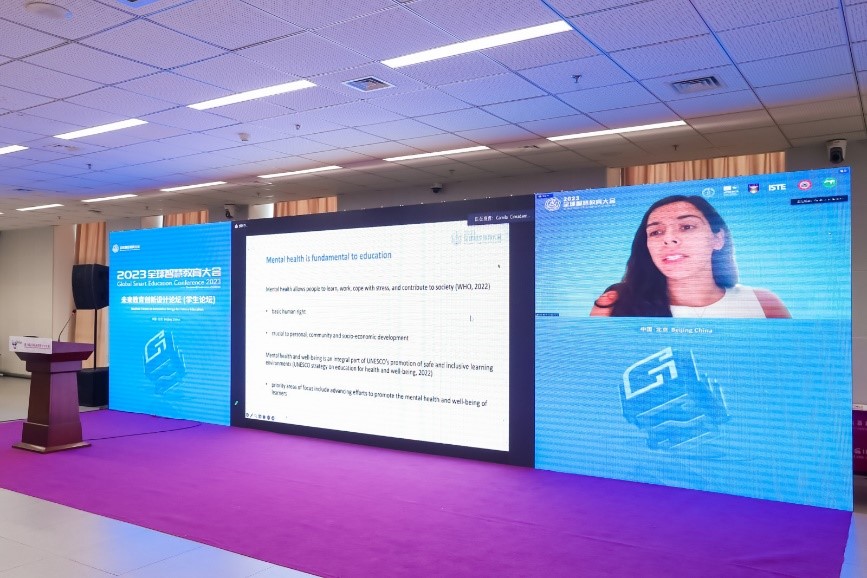
Speaker: Ms. Camila Cimadamore-Werthein
This Forum was jointly organized by the Student Union and Graduate Student Union of Beijing Normal University, UNESCO IITE, Beijing Design Society, Teacher Education Faculty, Psychometrics Centre at the University of Cambridge, and Smart Learning Institute of Beijing Normal University.

